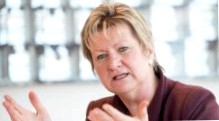
When neo-Nazis carried out the arson attack in Solingen 25 years ago, Sylvia Lohrmann sat for the Green Party on the city council there. In the interview she remembers the day and a politically heated climate.
Interviewer: How did you understand the 29. May 1993 experienced?
Sylvia Lohrmann (Green Party politician): The day itself I did not experience so intensively, you have to remember again: we had no cell phones. I was on my way to the twin city of Aue on Whitsun Saturday to visit friends there. And then came the news of an attack in Solingen. We had heard the sirens, but there was nothing in the newspapers yet. We, my husband and I, immediately turned back, because we were all challenged. We all couldn't believe it, and of course it all comes up again on such a commemorative day as today.
Interviewer: You were present at the memorial service in Dusseldorf today, as a private person and as a friend or. Acquaintances of the Genc family. How was this commemoration?
Lohrmann: Thank God that the right words were found by those involved. I am always impressed by how much Mrs. Genc, who has now lost five close family members, always manages to say, despite the pain: "We have to look forward, not back. We must all live peacefully together in this country." She has stressed that Turkey is her home, but that she is now also at home in Germany. With such great human words she actually gives the lie to all those who still think that Germany is a country where foreigners have no place and do not want to accept that we are an immigration society. That's what matters, and in my opinion, that's in danger more than ever. That is why it is a very special commemoration this year in Germany.
Interviewer: Chancellor Helmut Kohl did not attend the funeral service for the victims because, as his spokesman explained, he did not think much of "condolence tourism". How did you feel at the time?
Lohrmann: I had no sympathy for that at the time, and I still don't. That's why it was also very good that the chancellor was there today. That the discussion about Turkey and the foreign minister was not in the foreground. The situation in Turkey is different today than it was then, I understand all that. But the commemoration and the call, the reminder to our society, that was crucial today. I can only wish all the people, including the politicians who turn to the right, that they meet Mrs. Genc in person one day. Then perhaps they would also speak differently.
Interviewer: There was a rather heated atmosphere in Germany at the time. Many refugees from the former Yugoslavia came to us, the asylum law was changed, there was this much quoted and often used phrase: "The boat is full". Do you see parallels with today?
Lohrmann: In any case, and that concerns me very much. One notices that there has been a shift to the right. If I had been asked at the time whether I could have imagined that right-wing radicals and, in parts, right-wing extremists would be sitting in the German Bundestag and in many state parliaments today, I would have said, "No.". Despite these attacks. That is one thing.
Furthermore, I also see parallels in the rhetoric that fosters xenophobia. Chancellor Merkel and Prime Minister Laschet also addressed this today. We just have to be careful what we do with our language. Because language is followed by action and that can have such consequences.
On the other hand, I also see what society has learned: We have an immigration society, which we are shaping. We know the importance of education, of good coexistence, and we must continue to work on this, so that this right-wing populism does not take hold even more than it already has. And that's where politics is challenged, the media is challenged and of course the whole of society.
Interviewer: Shouldn't she also fight back? The AfD in Solingen has just publicly doubted the radical right-wing motives of this act of that time. Can you think of anything else?
Lohrmann: This is unspeakable and I am at a loss for words, because there is a court that has found the perpetrators guilty. And we had the NSU murders, where it only came out later that the people in the Keupstrabe did not kill each other.
It must be made clear again that state authorities were blind to the right here. The chancellor has also admitted this, and it is part of the process of coming to terms with history. This can only be rejected and one should face the really important tasks: Human dignity is inviolable. The dignity of every human being, not only that of Germans and ethnic Germans.
The interview was conducted by Uta Vorbrodt.